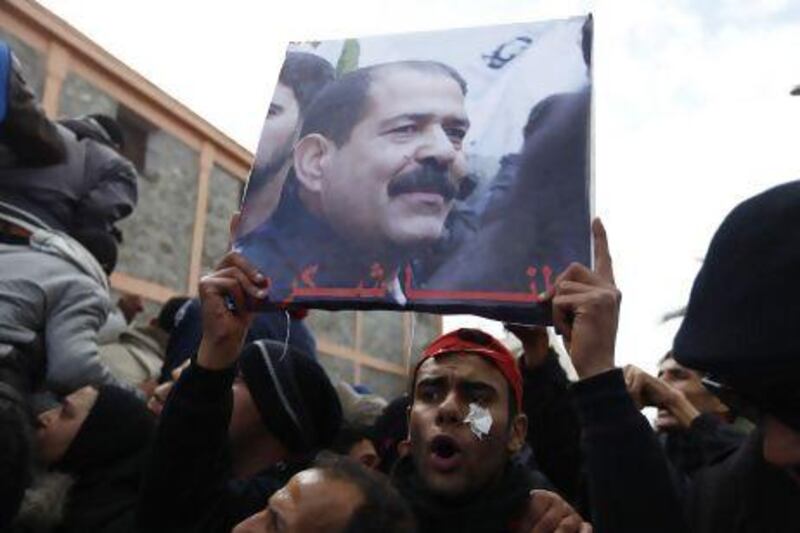The first political assassination in Tunisia following its revolution more than two years ago has severely shaken the image of a country hitherto hailed as a model for democratic transition in the Arab world. Chokri Belaid, the head of the leftist opposition Unified Democratic Nationalist party, was assassinated on February 6 by four bullets in the head and chest outside his home in Tunis, by a man on a motorcycle whose identity is still unknown.
The incident led to protests of several thousand people and a general strike, with many people calling for the fall of the Islamist-led government, which saw several of its offices attacked by angry protesters following the incident.
Ennahda's prime minister, Hamadi Jebali, condemned the assassination as "a criminal act, an act of terrorism not only against Belaid but against the whole of Tunisia".
Yet, what makes this cowardly and cruel assassination for many a direct challenge to the legitimacy of Ennahda - whose leaders are currently discussing the possibility of redistributing power within the government - is Belaid's outspoken criticism of the ruling Islamists, as well as his vocal suspicion that some of its members, in particular those belonging to the League for the Protection of the Revolution, were behind some of the recent resurgence of violence in Tunisia.
Ever since the ousting of the autocratic Zine El Abidine Ben Ali regime, in January 2011, Tunisia has witnessed a resurgence in religiously-motivated violence, mostly due to the increase in the number of Salafists, including of the violent jihadist trend, a movement that is estimated to have reached around 10,000 adherents.
Regional turmoil has also provided opportunities for more illegal weapons trafficking, mostly from Libya and Algeria. Only in December last year, a terrorist cell affiliated with Al Qaeda in the Islamic Maghreb - whose members received training and weapons in Tunisia's neighbouring countries and were plotting terrorist attacks on Tunisian soil - was dismantled by the regime.
In September 2012, violent Salafists enraged by an American film considered blasphemous attacked the US Embassy in Tunis and ransacked an American school. The incident left three people dead and caused the US Embassy to order its non-essential personnel to leave the country. Earlier, in June, an attack on an art exhibition in La Marsa led to the death of one and the arrest of over 150 people; several offices of Tunisia's main trade union had been firebombed during the same month. This illustrates not only that the number of religiously-motivated violent incidents is increasing, but also their intensity and scale.
Several factors account for Tunisia seemingly becoming a staging ground for jihadist action. One important element is the release of many Salafist leaders from prison in recent months, as well as the return of many ultraconservative exiles following the revolution. This enabled the radical Islamist group, Ansar Al Sharia, to open a Tunisian branch, which is suspected of being behind much of the recent violence in the country. Also, the Salafists' control of many mosques in Tunisia is contributing to a more general trend towards religious ultraconservatism in the country.
Another element at play is the regime's "soft" response to much of the violence. In particular, members of the League for the Protection of the Revolution have been held responsible for attacks on journalists and opposition figures, incidents the ruling Islamists have often turned a blind eye on. The league was founded by both leftists and Islamists after the fall of the former regime, but many now accuse it of being increasingly dominated by violent Islamist forces, including members affiliated with Ennahda.
Taken together, all these factors account for a toxic combination that culminated in this week's assassination of Belaid.
Since then, a stew of unrest has gripped Tunisia. Angry protesters continue to accuse Ennahda of the murder; Tunisian opposition groups are threatening to pullout of the constituent assembly tasked with rewriting the constitution; and a general strike has been called by the country's main trade union, the UGTT.
But the situation is also exacerbated by internal divisions within Ennahda: some members favour the establishment of a technocratic government, while others argue that Tunisia needs a strong ruling coalition to overcome the crisis. The political deadlock and overt confrontation between Tunisia's ruling party and the political opposition might result in further delays in constitution-drafting and elections, which were scheduled to be held later this year.
Ironically, the single most important group that is likely to profit from such political turmoil - which will also make Tunisia's economic recovery more difficult than expected - are the Salafists, many of whom rely on the country's disenchanted and unemployed youth as recruits. The government's dealing with the crisis, and the speed of its response, is therefore crucial in laying the path Tunisia's revolution will take.
Many of Tunisia's revolutionary achievements still hold, despite the country's shaken image. That said, overcoming this setback should be imperative to all those who want Tunisia's revolution to succeed.
Anne Wolf is a journalist, researcher and political risk analyst based in Tunis





